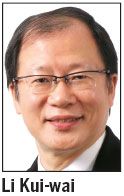Rising welfare presents new challenges
Updated: 2014-01-29 07:19
By Li Kui-wai
|
|||||||
A major economic grievance which residents in Hong Kong complain about is the large number of mainland visitors coming to Hong Kong on a daily basis to shop for goods which are either in short supply or of poor quality on the mainland. Although this benefits retail businesses, complaints about the social cost are rising. Related grievances concern new mainland immigrants, who can help replenish the shortage of labor and the low-birth rate in Hong Kong in the long term, but the more immediate problem is that many have "low personal endowments" - they are often poor and low-skilled - and may have to rely on social welfare.
Having experienced the Asian financial crisis in 1998, many residents in Hong Kong have also become less competitive in the job market. The Hong Kong government has been very keen to aid the poorer sectors. The consequences are that the "ability reward" mentality is rapidly fading in Hong Kong.

In addition to many non-economic grievances, the economy is suffering from two major problems. One can be considered as "full capacity" or structural rigidity, where jobs are not created easily. Second, a lot of wealth-generating economic activities come narrowly from two sources: property and stock market speculations. The movements in these nominal activities are not helping the economy develop. Even though employment remains robust and the unemployment rate has stabilized at around 3 percent, many service-related jobs do not allow much upward social mobility. Increases in salaries are not rapid and job promotions not always easy.
In Hong Kong, a rise in government welfare expansion occurs in economically difficult times, but fiscal contraction is expected during economic booms to avoid inflation and the economy overheating. Since 1994, government welfare expenditure has kept rising in two ways: more for each welfare item; and more welfare items have been created. Welfare provision has become a dominant feature of the Hong Kong economy, despite the low unemployment rate and the absence of a visible economic recession. One can foresee a "vicious circle" of welfare provisions. This could erode individuals' incentives and Hong Kong's robust fiscal surplus which helps maintain a high degree of economic stability.
There are a growing number of people, especially poorer or less-skilled individuals and their families, prepared to adopt a "take" attitude. The "have nots" will definitely take what is given and ask for more next time.
Since there are more poor or low-skilled individuals than wealthy ones in all societies, politicians wanting to be popular will take public resources to use for their own political ends. Spending welfare on low-income people is attractive - especially when Hong Kong has a large fiscal surplus.
One has to be careful about the rise of such a "take" mentality or culture in Hong Kong. When people are not happy with socio-economic issues, they complain using all means possible and demand compensation. When people face economic hardship, there are sympathetic organizations and individuals keen to pressure the government to meet popular demand with more welfare spending.
The Hong Kong economy is being divided into extremes. The free-market capitalist system which helped Hong Kong become an advanced economy requires individual incentive, creativity and self-discipline. The market serves as the mediator for entrepreneurial individuals to earn their "first bucket of gold". On the contrary, due to popular demand, the rising number of poorer individuals and changing socio-political attitudes, welfare spending has become an instrument for non-economic ends. Such behavior will encourage people with a "take" mentality to flourish. Young people in Hong Kong will be at a loss when faced with such an extreme choice: Should one be innovative, creative and fend for oneself - or just adopt the "take" attitude and be dependent on increasing welfare assistance?
The message to leaders in Hong Kong is clear. Do you want future residents to stand on their own economic feet, or rely on welfare? The answer should not be linked to any interest groups, but for the benefit of all Hong Kong residents.
The author is associate professor of the Department of Economics and Finance at City University of Hong Kong.
(HK Edition 01/29/2014 page1)